The American Football League was a 63 1/2-point underdog when it opened for doom in the 1960 season. History said it had no chance. Only the All-America Football Conference had been able to compete with the NFL for any length of time to that point. Even then, only three of the nine AAFC teams were invited to join the established league.
What’s more, the NFL was at the height of its popularity at the time. It had the best players, played in the best stadiums and had franchises in the largest markets.
The original AFL consisted of eight teams — the Boston Patriots, Buffalo Bills, Dallas Texans, Denver Broncos, Houston Oilers, New York Titans, Oakland Raiders and Los Angeles Chargers. Sure enough, they struggled to tread water in the early years, mostly with veteran has-beens, younger no-names and a few hidden gems out of small colleges. If not for an entertaining, bombs-away brand of ball and a five-year television deal to broadcast it around the country, the new league would have gone belly up in two or three years at most.
In 1965, the AFL made its first big break. One year after the New York Jets moved into brand-new Shea Stadium, they drafted and signed high-profile Alabama quarterback Joe Namath to an unheard-of $400,000 contract to became the sexy face of an emboldened league. The first big domino had been tipped over. Jaws dropped. More young talent followed him. The product improved noticeably. Attendance spiked. Rather than get involved in costly bidding wars, concerned NFL team owners decided it would be wiser to merge leagues. Every one of the 10 AFL teams (the Miami Dolphins and Cincinnati Bengals were the others) made the cut.
Here’s a tribute to the best players who beat the odds. While there was no set formula to rank them, career statistics and achievements as well as Approximate Value (courtesy of Pro Football Reference) were heavily considered.
Len Dawson, Quarterback
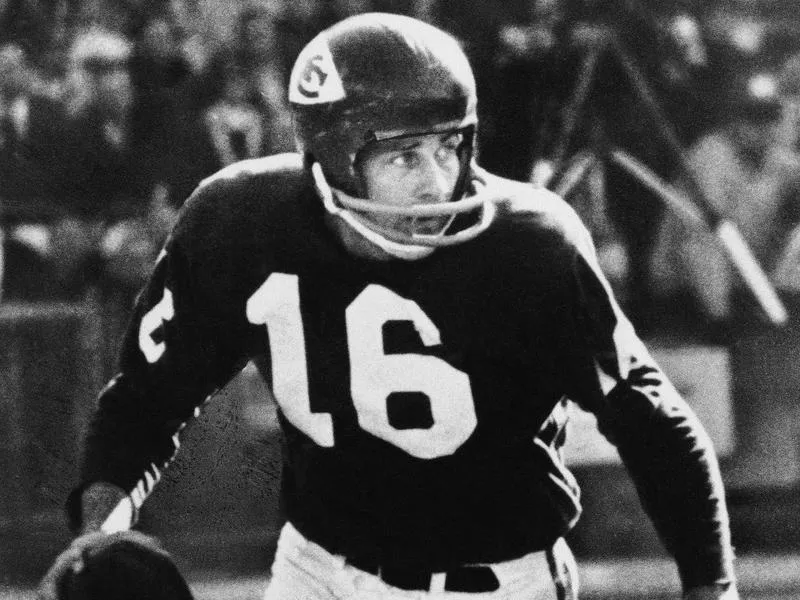
Kansas City Chiefs quarterback Len Dawson in 1969. AP Photo
Career: 8 seasons (1962-69)
Teams: Dallas Texans/Kansas City Chiefs
Approximate Value/14 games: 13.3
Statistics/14 games: 56.8 pass completion percentage, 2,472.8 yards, 23.8 touchdowns
All-Star Games: 1962, 1964, 1966, 1967, 1968, 1969
League championships: 1962, 1966, 1969 (Super Bowl IV)
Bottom line: As the AFL’s all-time leader in completion (56.8) and interception (4.7) percentages, Len Dawson was easily the most efficient quarerback in league history. The Cleveland Browns castoff won nearly two of every three starts (66.3 percent) and was the only signal-caller to lead his team to as many as three league titles.
Oh, and was there a cooler nickname than “Lenny the Cool”?
Honorable mention: George Blanda (Houston Oilers, Oakland Raiders), Jack Kemp (Los Angeles/San Diego Chargers, Buffalo Bills), Joe Namath (New York Jets)
Cookie Gilchrist, Fullback
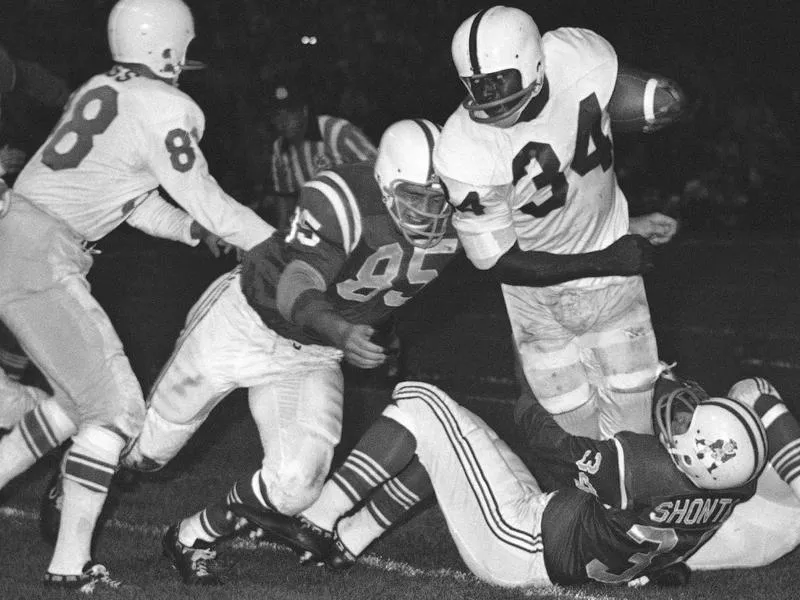
Buffalo Bills fullback Cookie Gilchrist runs against the Boston Patriots in 1962. Bill Chaplis / AP Photo
Career: 6 seasons (1962-67)
Teams: Buffalo Bills, Denver Broncos, Miami Dolphins
Approximate Value/14 games: 9.7
Statistics/14 games: 1,169.1 yards/scrimmage, 4.8 yards/touch, 9.3 touchdowns
All-Star Games: 1962, 1963, 1964
League championships: 1964
Bottom line: Lookie, lookie, lookie, here comes Cookie. And pity the defender who got in his way. Cookie Gilchrist was to the AFL what Jim Brown was to the other league, a 251-pound brute who wore out everyone from opponents to his own coaches and team owner.
His sensational 1962 season established the rookie standard — league highs of 1,096 yards rushing and 13 touchdowns plus eight field goals to boot.
Gilchrist left the Bills in a contract dispute after three dominant seasons. It wasn’t until decades later that the organization finally afforded him Wall of Fame status.
Honorable mention: Hoyle Granger (Houston Oilers), Keith Lincoln (San Diego Chargers), Jim Nance (Boston Patriots, New York Jets), Matt Snell (New York Jets)
Abner Haynes, Halfback
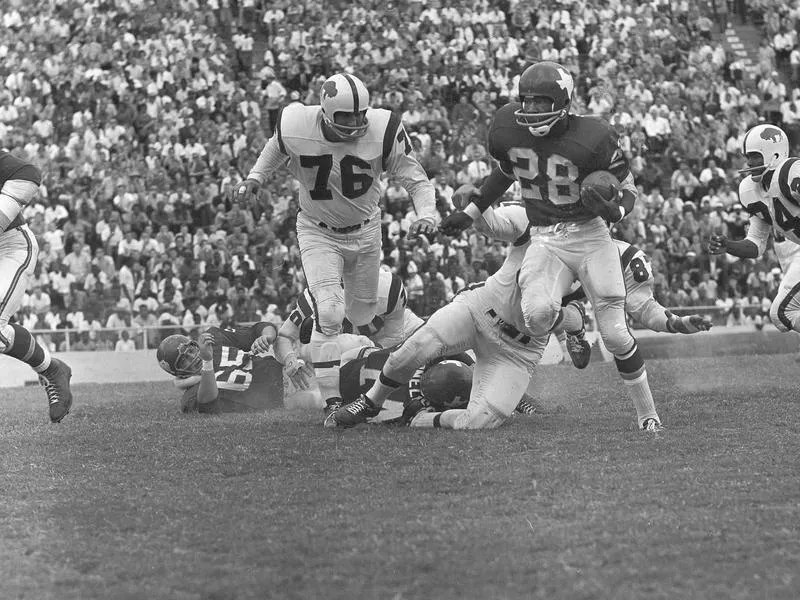
Dallas Texans halfback Abner Haynes runs with the ball against the Buffalo Bills in 1962. AP Photo
Career: 8 seasons (1960-67)
Teams: Dallas Texans/Kansas City Chiefs, Denver Broncos, Miami Dolphins, New York Jets
Approximate Value/14 games: 10.0
Statistics/14 games: 1,020.6 yards/scrimmage, 6.2 yards/touch, 8.2 touchdowns
All-Star Games: 1961, 1962, 1964
League championships: 1962
Bottom line: Abner Haynes was hell on wheels. A freakish combination of flash and dash, the first Most Valuable Player in AFL history could score on any play from any spot on the field.
“He was a franchise player before they talked about franchise players,” his coach Hank Stram once said.
Li’l Abner scored 43 touchdowns in his first 42 games and finished as the all-time league leader in total yardage. Six decades after retirement, the North Texas product still holds a bunch of team records.
Honorable mention: Billy Cannon (Houston Oilers, Oakland Raiders), Clem Daniels (Dallas Texans, Oakland Raiders), Paul Lowe (Los Angeles/San Diego Chargers, Kansas City Chiefs)
Charley Hennigan, Split End
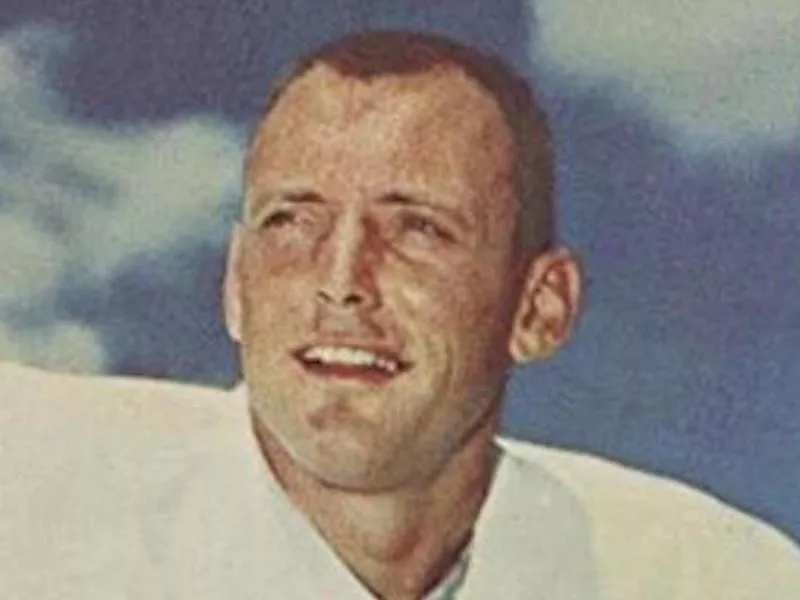
Charley Hennigan in 1963. Amazon
Career: 7 seasons (1960-66)
Teams: Houston Oilers
Approximate Value/14 games: 10.5
Statistics/14 games: 60.4 pass receptions, 1,005.5 yards, 7.5 touchdowns
All-Star Games: 1961 1962, 1963, 1964, 65
League championships: 1960 1961
Bottom line: Red zone monster Art Powell had an identical AV number, but Charley Hennigan got the call for his star role with the first two AFL championship teams.
In his second season, he put up numbers that were off the charts in the pre-merger era — 82 catches, 1,746 yards and 12 touchdowns in 14 games.
Honorable mention: Art Powell (New York Titans, Buffalo Bills, Oakland Raiders), George Sauer (New York Jets), Lionel Taylor (Denver Broncos, Houston Oilers), Otis Taylor (Kansas City Chiefs)
Lance Alworth, Flanker
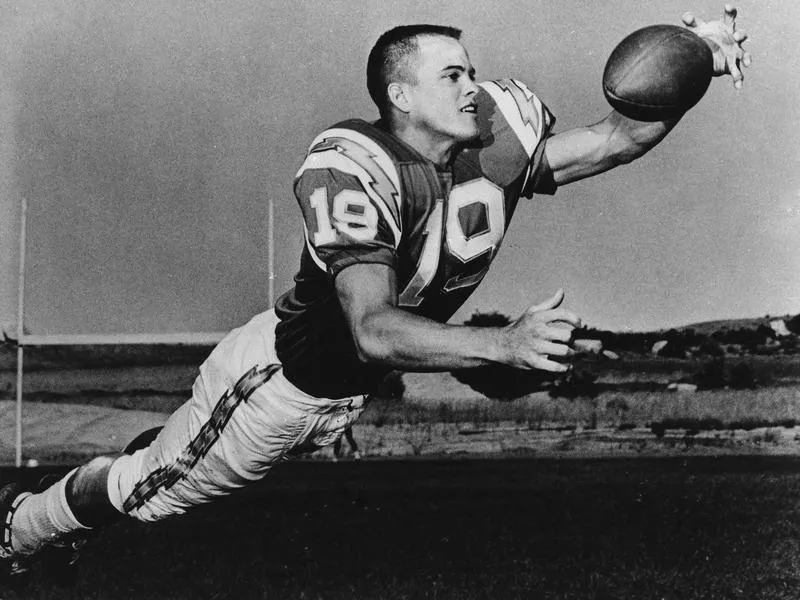
San Diego Chargers flanker Lance Alworth in 1963. AP Photo
Career: 8 seasons (1962-69)
Teams: San Diego Chargers
Approximate Value/14 games: 14.9
Statistics/14-games: 66.1 pass receptions, 1,295.5 yards, 11.1 touchdowns
All-Star Games: 1963, 1964, 1965, 1966, 1967, 1968, 1969
League championships: 1963
Bottom line: Forget the position. Lance Alworth was the most dominant offensive player in AFL history. Period.
Defenses targeted “Bambi” from the time that he arrived at the stadium. Didn’t matter. The one-time track star could outrun, outleap and outmaneuver one or more defenders — all on the same play often times. He amassed 1,000 or more yards in seven consecutive seasons and 10 or more touchdowns in four in a row.
Said his longtime coach Sid Gillman: “He could run and jump like nobody that has ever played this game. He had a beautiful pair of hands that could catch anything thrown in his direction.”
Honorable mention: Don Maynard (New York Titans/Jets)
Fred Arbanas, Tight End
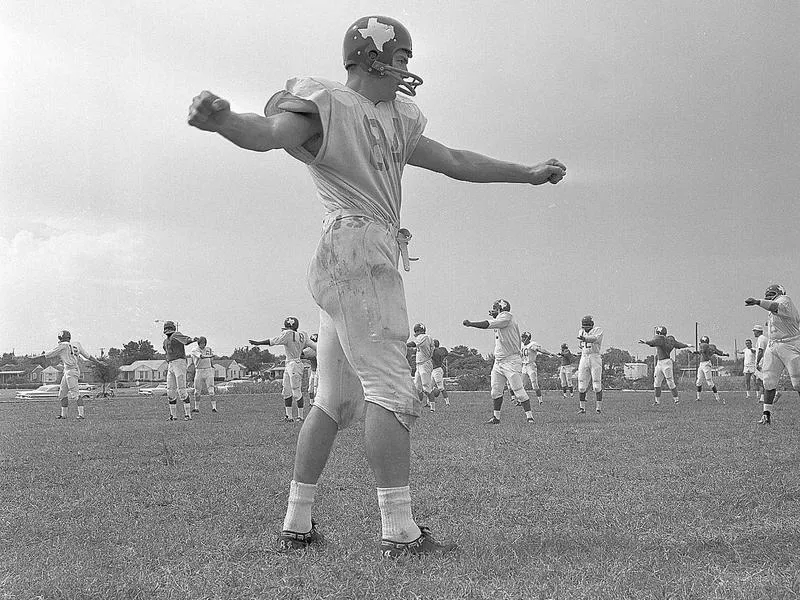
Dallas Texans tight end Fred Arbanas leads team calisthenics in 1962. AP Photo
Career: 8 seasons (1962-69)
Teams: Dallas Texans/Kansas City Chiefs
Approximate Value/14 games: 4.8
Statistics/14 games: 23.7 pass receptions, 374.1 yards, 4.1 touchdowns
All-Star Games: 1962, 1963, 1964, 1965, 1967
League championships: 1962, 1966, 1969 (Super Bowl IV)
Bottom line: Tight ends were primarily blockers in the AFL era, with the league-wide emphasis on the vertical pass game. None did it better than the 6-foot-3, 240-pound Fred Arbanas, who was akin to a second tackle at the strong side of the line.
Honorable mention: Dave Kocourek (Los Angeles/San Diego Chargers, Miami Dolphins, Oakland Raiders), Bob Trumpy (Cincinnati Bengals)
Jim Otto, Center
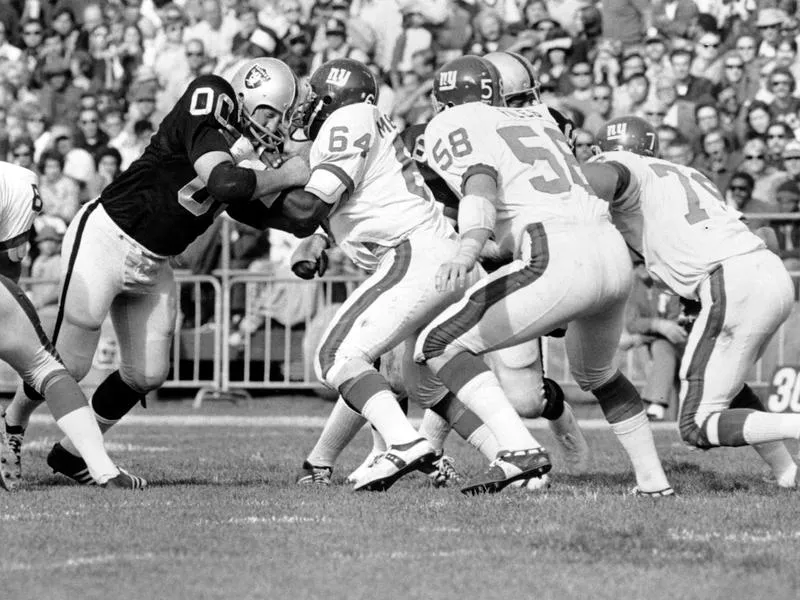
Oakland Raiders center Jim Otto blocks against the New York Giants in 1973. AP Photo
Career: 10 seasons (1960-69)
Teams: Oakland Raiders
Approximate Value/14 games: 10.7
All-Star Games: 1961, 1962, 1963, 1964, 1965, 1966, 1967, 1968, 1969
League championships: 1967
Bottom line: Jim Otto started every Raiders game in their AFL history, 140 in all.
He also was an All-Pro selection in nine of the league’s 10 seasons.
Small wonder that “Double O” was the third AFL player inducted into the Pro Football Hall of Fame, and it happened in his first year of eligibility.
Ed Budde, Guard
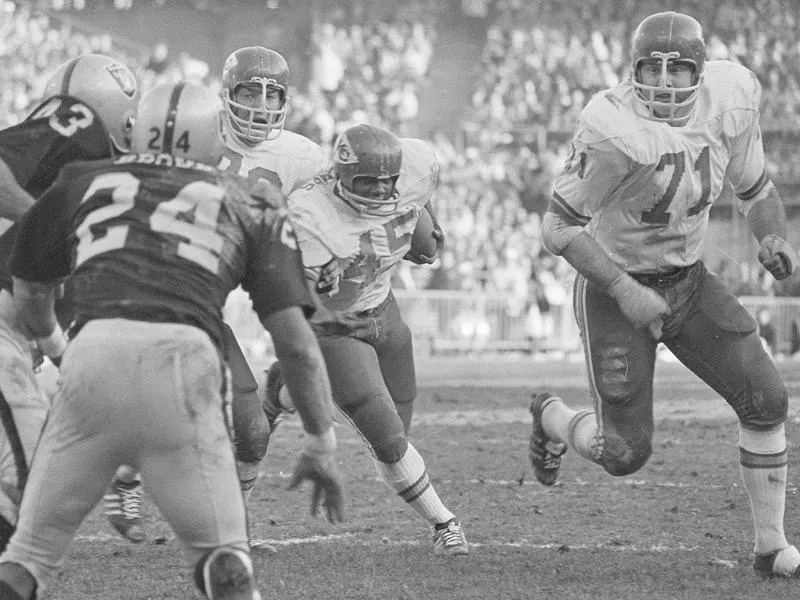
Kansas City Chiefs guard Ed Budde, right, blocks against the Oakland Raiders in 1970. AP Photo
Career: 7 seasons (1963-69)
Teams: Kansas City Chiefs
Approximate Value/14 games: 8.9
All-Star Games: 1963, 1966, 1967, 1968, 1969
League championships: 1966, 1969 (Super Bowl IV)
Bottom line: Ed Budde was a product of the 1963 draft, which saw the Chiefs fleece both leagues for one of the greatest talent hauls ever.
The heist included defensive tackle Buck Buchanan and linebacker-end Bobby Bell, both future Hall of Famers.
Budde deserves to be in Canton with them. His stellar play continued into his 30s after the merger, when he was a two-time Pro Bowl selection.
Billy Shaw, Guard
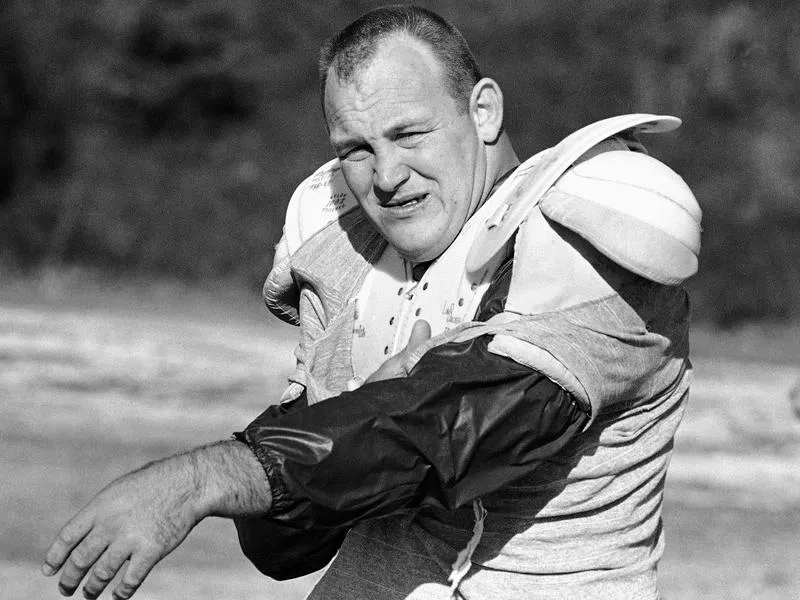
Buffalo Bills guard Billy Shaw in 1966. DM / AP Photo
Career: 9 seasons (1961-69)
Teams: Buffalo Bills
Approximate Value/14 games: 8.0
All-Star Games: 1962-69
League championships: 1964, 1965
Bottom line: The Bills’ mini-dynasty revolved around a robust defense and ground-and-pound attack. Billy Shaw was the anchor at left guard, where he escorted the likes of Cookie Gilchrist and Wray Carlton, among others.
Even the more NFL-inclined voters became convinced of his greatness eventually. They made Shaw the first AFL lifer to have a bust in Canton.
Honorable mention: Walt Sweeney (San Diego Chargers), Bob Talamini (Houston Oilers, New York Jets)
Ron Mix, Tackle
Career: 10 seasons (1960-69)
Teams: Los Angeles/San Diego Chargers
Approximate Value/14 games: 10.7
All-Star Games: 1961, 1962, 1963, 1964, 1965, 1966, 1967, 1968
League championships: 1963
Bottom line: How drop-dead good was Ron Mix in his 10 seasons? Good enough to be named All-Pro in all except the final one.
Mix was the complete package of smarts, strength and athleticism. He was mobile enough to lead sweeps, quick enough to executive in-line blocks, strong enough to push back pass-rushers and determined enough to execute a second and even third block downfield.
Pound for pound, there was none better in the line.
Jim Tyrer, Tackle
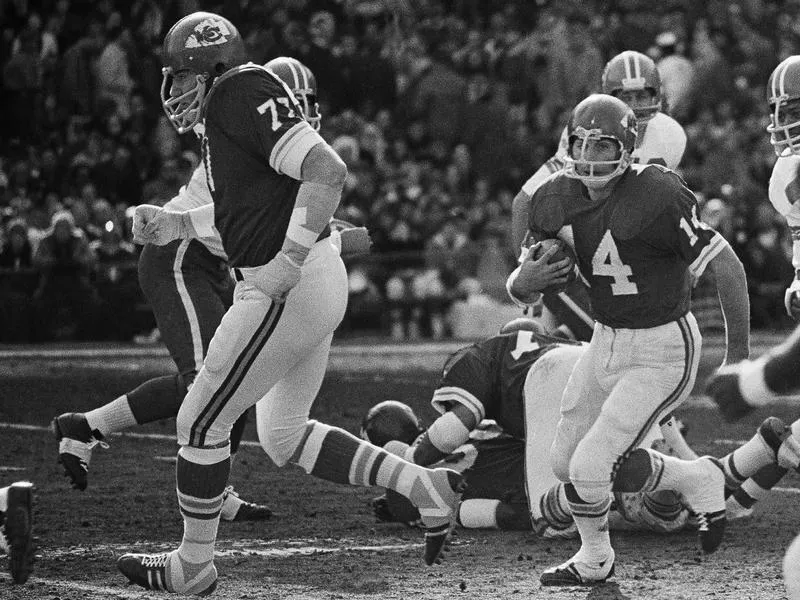
Kansas Chiefs tackle Jim Tyrer, left, looks for someone to block against the Denver Broncos in 1970. William Straeter / AP Photo
Career: 9 seasons (1961-69)
Teams: Dallas Texans/Kansas City Chiefs
Approximate Value/14 games: 10.4
All-Star Games: 1962, 1963, 1964, 1965, 1966, 1968, 1969
League championships: 1962, 1966, 1969 (Super Bowl IV)
Bottom line: Coach Hank Stram liked monstrous linemen and miniature running backs. Made it harder for defenders to get a bead on the ballcarrier, he theorized. Well, Jim Tyrer was so large, zoo animals could have fed him.
The 6-foot-6, 280-pound road grater helped pave the way for three league championship teams. The offense ranked either first or second in yards per rush in seven of his nine seasons.
Tyrer continued to excel after the merger, when he was a two-time Pro Bowl and one-time All-Pro selection. It’s a felony that the Hall of Fame hasn’t called his name yet.
Honorable mention: Stew Barber (Buffalo Bills), Winston Hill (New York Jets), Al Jamison (Houston Oilers)
Jim Turner, Placekicker
Career: 6 seasons (1964-69)
Teams: New York Jets
Statistics/14 games: 102.0 points, 22.3 field goals, .606 field goal percentage
All-Star Games: 1968, 1969
League championship: 1968 (Super Bowl IV)
Bottom line: If Jan Stenerud had played more than the final three seasons of the AFL, he would have been the pick. For excellence over an extended period, Jim Turner was the surest foot around.
Known as “Tank” for his 6-foot-2, 205 pounds, Turner owned the league record for most field goals in one season (34, twice) and most consecutive games (18).
Fun fact: He accounted for 10 of the 23 points scored in Super Bowl III.
Honorable mention: Stenerud (Kansas City Chiefs); George Blanda (Houston Oilers, Oakland Raiders), Gino Cappelletti (Boston Patriots)
Bobby Jancik, Kickoff Returner
Career: 6 seasons (1962-67)
Teams: Houston Oilers
Statistics/14 games: 27.3 returns, 26.5 yards/attempt, 0.0 touchdowns
All-Star Games: None
League championships: None
Bottom line: No AFL player returned more kickoffs for a higher average than the Lamar (Texas) product. Bobby Jancik’s five returns for 139 yards were a factor in the 1962 league championship game.
Hard to believe the cornerback never took a kickoff to the house, but that only made his consistency more impressive.
Honorable mention: Speedy Duncan (San Diego Chargers), Dave Grayson (Dallas Texans/Kansas City Chiefs, Oakland Raiders), Abner Haynes (Dallas Texans/Kansas City Chiefs, Denver Broncos, Miami Dolphins, New York Jets)
Earl Faison, Defensive End
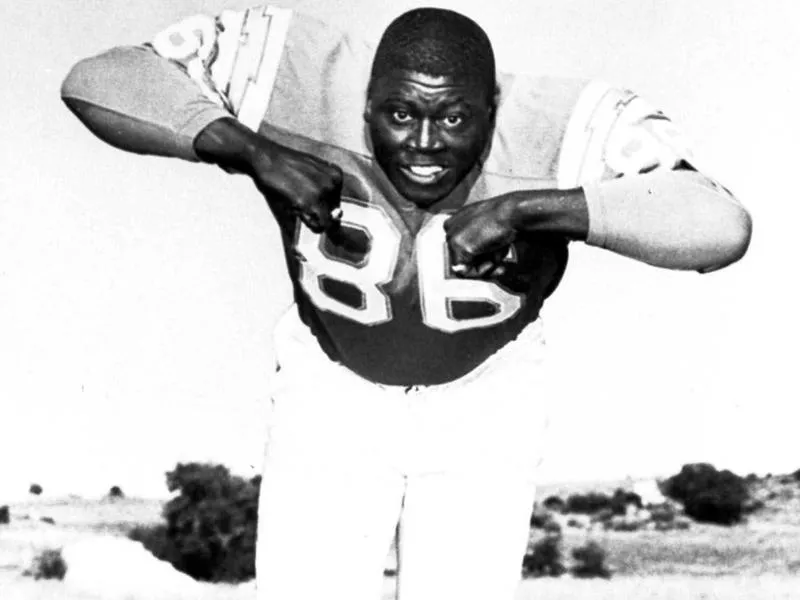
San Diego Chargers defensive end Earl Faison in 1964. AP Photo
Career: 6 seasons (1961-66)
Teams: San Diego Chargers, Miami Dolphins
Approximate Value/14 games: 12.1
All-Star Games: 1961, 1962, 1963, 1964, 65
League championships: 1963
Bottom line: The, um, Hall of Fame experts who left Faison off its All-Time AFL first team have lots of explaining to do. At 6-foot-5, 270 pounds, “The Tree” was a member of the original “Fearsome Foursome” and the first dominant edge rusher in the league.
He was a first-team All-Pro in four of his first five seasons before a bum back complicated by a contract dispute cut short his career.
“From the time I was a rookie through my entire career with the Chargers, everything he did, I tried to copy,” said teammate Bob Petrich, who served as the bookend on the right side. “He helped me improve more than I could’ve ever done without him.”
Jerry Mays, Defensive End/Tackle
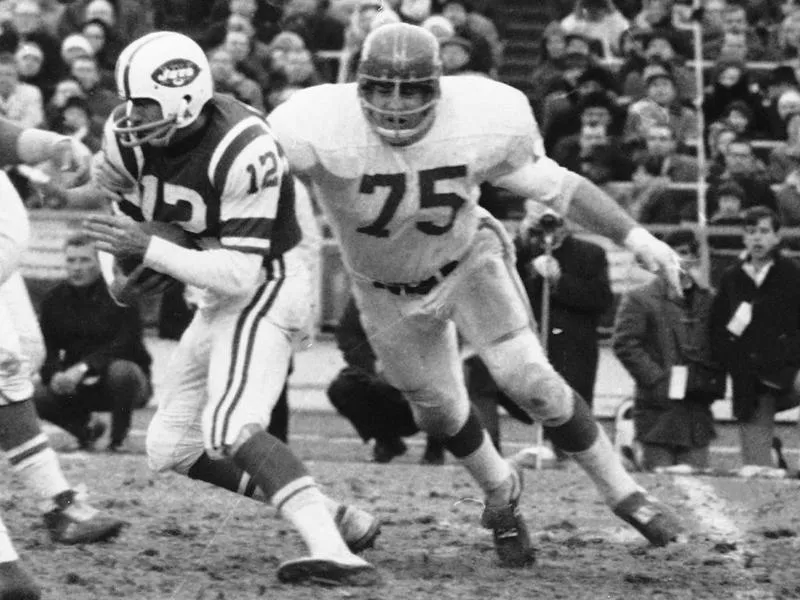
Kansas City Chiefs defensive end Jerry Mays chases New York Jets quarterback Joe Namath during an AFL game in 1967. AP Photo
Career: 6 seasons (1961-69)
Teams: Dallas Texans/Kansas City Chiefs
Approximate Value/14 games: 10.2
All-Star Games: 1962, 1964, 1965, 1966, 1967, 1968
League championships: 1962, 1966, 1969 (Super Bowl IV)
Bottom line: The Dallas native balked at the franchise move to Kansas City initially. When a local milk company implored Chiefs fans to send him welcome messages on the side of cartons, he was overwhelmed by the response.
The career move was the first of two important ones for the franchise. Not long after Jerry Mays switched from tackle to end, teammate Bobby Bell came into his own at linebacker.
“A unique person and wonderful leader,” team owner Lamar Hunt called him. “He was fiercely dedicated to the survival of the AFL.”
Honorable mention: Larry Eisenhauer (Boston Patriots), Ron McDole (Buffalo Bills), Gerry Philbin (New York Jets)
Buck Buchanan, Defensive Tackle
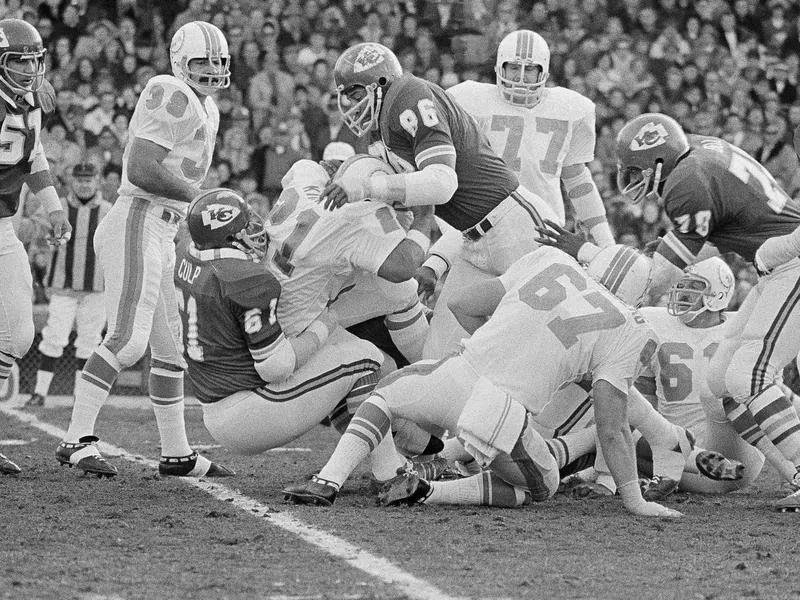
Kansas City Chiefs defensive tackle Buck Buchanan (86), center, makes a tackle against the Miami Dolphins in 1971. AP Photo
Career: 7 seasons (1963-69)
Teams: Kansas City Chiefs
Approximate Value/14 games: 11.1
All-Star Games: 1964, 1965, 1966, 1967, 1968, 1969
League championships: 1966, 1969 (Super Bowl IV)
Bottom line: In 1963, the Chiefs drafted the 6-foot-7, 270-pound Buck Buchanan with the first overall pick, which they had acquired in exchange for veteran quarterback Cotton Davidson from the Oakland Raiders. d
Two years later, the Raiders drafted guard Gene Upshaw in an attempt to neutralize the massive Grambling product, who was clocked at 4.9 seconds in the 40-yard dash while in college.
“I was big, but Buck was bigger and stronger and turned me every which way but loose,” Upshaw would say later. “You don’t imagine a guy (of that size) being so quick. You’d go to hit him, and it was like hitting a ghost.”
Tom Sestak, Defensive Tackle
Career: 7 seasons (1962-68)
Teams: Buffalo Bills
Approximate Value/14 games: 10.5
All-Star Games: 1962-65
League championships: 1964, 1965
Bottom line: It was easier to surf Niagra Falls than to run the ball against the Bills’ defense in its heyday. Would you believe it didn’t allow a rushing touchdown in 17 consecutive games, a pro football record? Tom Sestak was a primary reason for it.
In the 1960s, Sestak was one of a half-dozen lineman who were unanimous All-League selections in three or more seasons. Willie Davis, Deacon Jones, Bob Lilly, Gino Marchetti and Merlin Olsen were the others.
Now riddle me this: Why is Sestak the only non-Hall of Famer of the bunch?
Honorable mention: Houston Antwine (Boston Patriots), Jim Dunaway (Buffalo Bills), Ed Husmann (Houston Oilers), Ernie Ladd (San Diego Chargers, Houston Oilers, Kansas City Chiefs), Bud McFadin (Denver Broncos)
Nick Buoniconti, Middle Linebacker
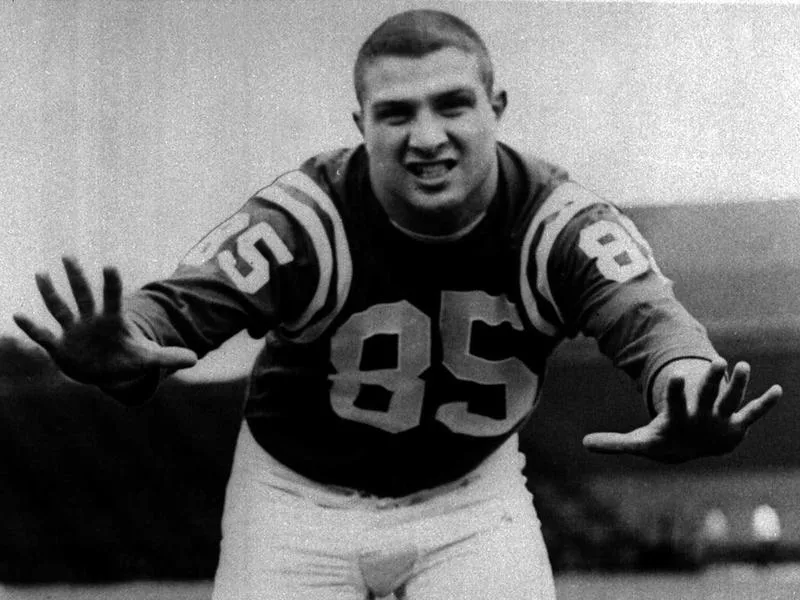
Boston Patriots middle linebacker Nick Buoniconti in 1963. AP Photo
Career: 8 seasons (1962-69)
Teams: Boston Patriots, Miami Dolphins
Approximate Value/14 games: 11.6
All-Star Games: 1963, 1964, 1965, 1966, 1967, 1969
League championships: None
Bottom line: While Nick Buoniconti would get more recognition for his work with the Miami Dolphins and their “No-Name Defense,” he was the ringleader of some pretty good Patriots units as well.
What the 5-foot-11, 220-pounder didn’t have in size, he more than made up for in uncommon mobility, keen instincts and relentless pursuit.
As Kansas City Chiefs QB Len Dawson once said, “If you are lucky enough to knock [Buoniconti] down, you have to lay on him, or he’ll get right back into the play.”
Honorable mention: Dan Conners (Oakland Raiders), Sherrill Headrick (Dallas Texans/Kansas City Chiefs, Cincinnati Bengals), Archie Matsos (Buffalo Bills, Denver Broncos, San Diego Chargers)
Bobby Bell, Outside Linebacker/Defensive End
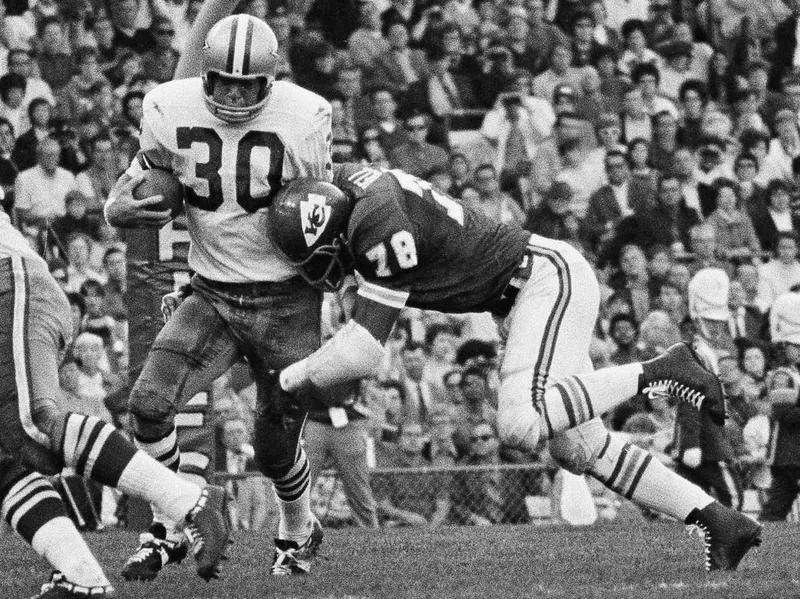
Kansas City Chiefs defensive end Bobby Bell brings down Dallas Cowboys running back Dan Reeves in 1970. AP Photo
Career: 7 seasons (1963-69)
Teams: Kansas City Chiefs
Approximate Value/14 games: 12.4
All-Star Games: 1964, 1965, 1966, 1967, 1968, 1969
League championships: 1966, 1969 (Super Bowl IV)
Bottom line: Remember those extra wide-sized shoulders and 32-inch waist? Bobby Bell began his Hall of Fame career as an All-Star end and finished it as an All-Universe linebacker.
He accounted for 24 turnovers in 98 games and scored touchdowns in five of his seven seasons. Dude, the guy even scored on an onside kick return.
Ask those in the know to name the most talented physical specimen in AFL history, and chances are, Bell’s name will be mentioned more often than any.
Mike Stratton, Outside Linebacker
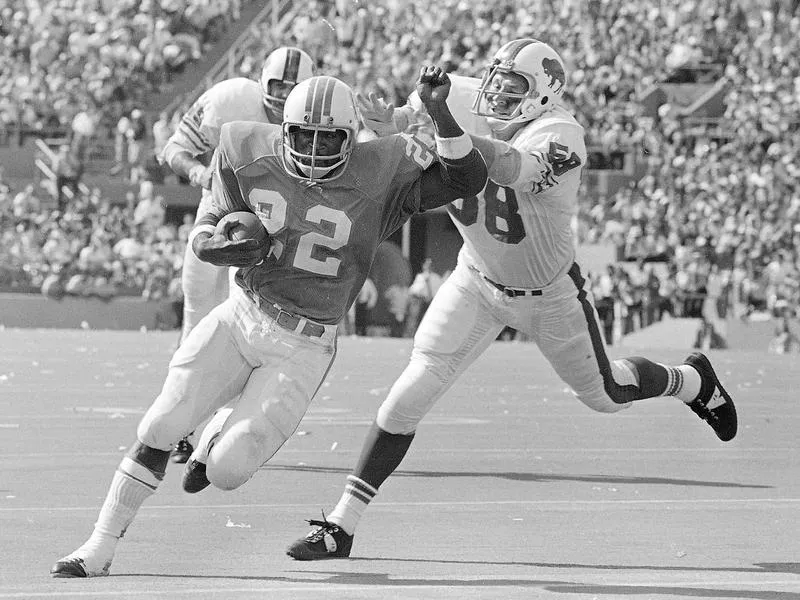
Buffalo Bills linebacker Mike Stratton, right, tries to stop Miami Dolphins running back Mercury Morris in 1972. Jim Bourdier / AP Photo
Career: 8 seasons (1962-69)
Teams: Buffalo Bills
Approximate Value/14 games: 10.4
All-Star Games: 1963, 1964, 1965, 1966, 1967, 1968
League championships: 1964, 1965
Bottom line: Mike Stratton was a five-time All-Star and three-time All-Pro, but Bills die-hards remembered him for the greatest play in Buffalo sports history.
The linebacker trucked San Diego Chargers star Keith Lincoln early in the 1964 AFL championship, a perfectly timed pancake tackle that busted three of his ribs and turned the game around.
The Bills didn’t allow another point in a 20-7 victory, the first of their two consecutive league titles.
Honorable mention: Tom Addison (Boston Patriots), Larry Grantham (New York Titans/Jets), E.J. Holub (Dallas Texans/Kansas City Chiefs), George Webster (Houston Oilers)
Butch Byrd, Cornerback
Career: 6 seasons (1964-69)
Teams: Buffalo Bills
Approximate Value/14 games: 11.0
Statistics/14 games: 6.0 interceptions, 100.5.0 yards, 0.7 touchdowns
All-Star Games: 1964, 1965, 1966, 1968, 1969
League championships: 1964, 1965
Bottom line: The Hall of Fame selected Willie Brown as its first-team cornerback, but Butch Byrd was the better all-around player and greater physical presence.
Plus, he had more quality seasons as a core member of two championship teams.
His 74-yard punt return was the dagger against the San Diego Chargers in the 1965 title game.
Dave Grayson, Cornerback/Safety
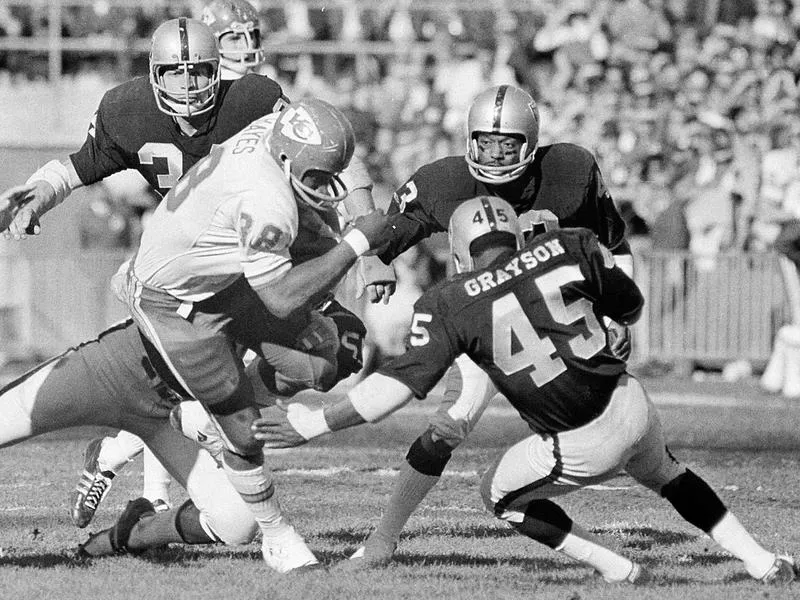
Oakland Raiders defensive back Dave Grayson tackles Kansas City Chiefs running back Wendell Hayes in 1970. AP Photo
Career: 9 seasons (1961-69)
Teams: Dallas Texans/Kansas City Chiefs, Oakland Raiders
Approximate Value/14 games: 10.2
Statistics/14 games: 4.8 interceptions, 94.0 yards, 0.5 touchdowns
All-Star Games: 1962, 1963, 1964, 1965, 1966, 1969
League championships: 1962
Bottom line: Dave Grayson was as dominant a shutdown cornerback as there was in the AFL, a game-changer who thrived on speed and instincts.
When the former Oregon halfback-track star turned runner, well, that’s when the fun really started. He carted back five of his AFL-record 47 interceptions for touchdowns.
The Dallas Cowboys’ reject also was an exceptional kickoff returner who ranked second in yards per attempt in back-to-back seasons.
Honorable mention: Brown (Denver Broncos, Oakland Raiders), Tony Banfield (Houston Oilers), Miller Farr (Denver Broncos, San Diego Chargers, Houston Oilers)
Johnny Robinson, Safety
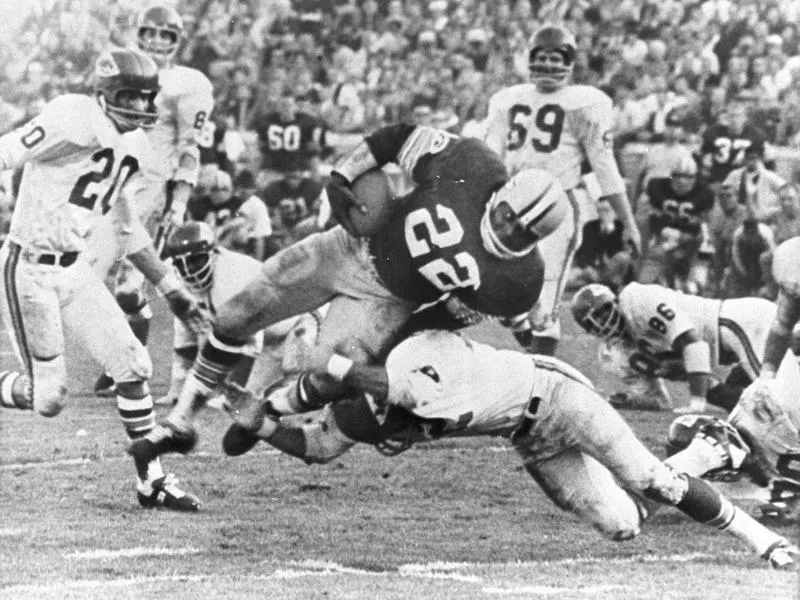
Kansas City Chiefs safety Johnny Robinson brings down Green Bay Packers running back Klijah Pitts in Super Bowl I in 1967. AP Photo
Career: 10 seasons (1960-69)
Teams: Dallas Texans/Kansas City Chiefs
Approximate Value/14 games: 10.5
Statistics/14 games: 4.4 interceptions, 54.9 yards, 0.1 touchdowns
All-Star Games: 1963, 1964, 1965, 1966, 1967, 1968
League championships: 1966, 1969 (Super Bowl IV)
Bottom line: Johnny Robinson scored 15 touchdowns as a halfback/flanker in his first two seasons, but with All-Star Abner Haynes also in the crowded backfield, Hank Stram believed the future Hall of Famer would be of more value as a ballhawk in the secondary.
The coach proved to be correct. In his five All-Pro seasons, Robinson accounted for a staggering 39 turnovers, or slightly more than one every other game.
George Saimes, Safety
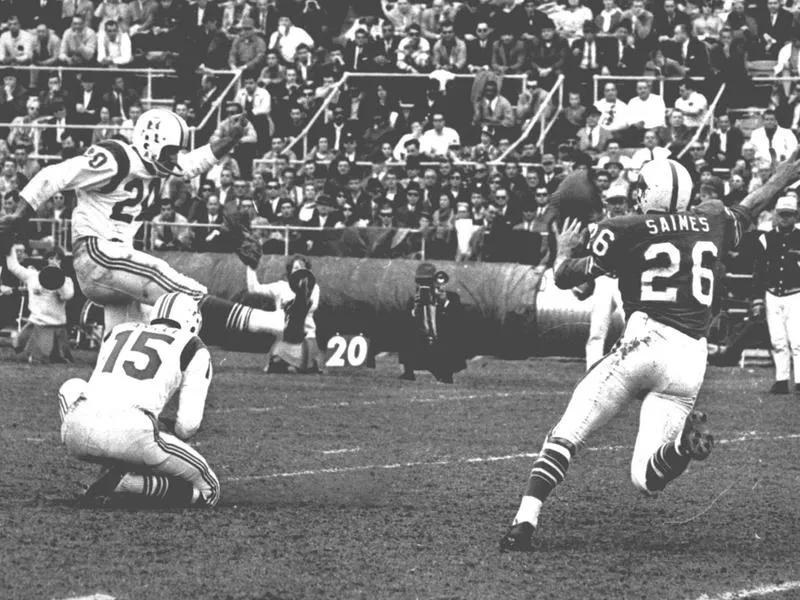
Buffalo Bills safety George Saimes makes a attempt to block a kick against the Boston Patriots. AP Photo
Career: 7 seasons (1963-69)
Team: Buffalo Bills
Approximate Value/14 games: 8.5
Statistics/14 games: 3.4 interceptions, 36.6 yards, 0.0 touchdowns
All-Star Games: 1964, 1965, 1966, 1967, 1968
League championships: 1964, 1965
Bottom line: George Saimes was a converted star fullback who hit with the same force at the strong safety position. He was an elite run-stopper and savvy pass defender on the most dominant defense in AFL history.
“One of the surest tacklers I ever saw,” longtime teammate Booker Edgerson would call Saimes later.”If he got his hands on you, more than likely, you were going to go down.”
Honorable mention: Goose Gonsoulin (Denver Broncos), Kenny Graham (San Diego Chargers), Ken Houston (Houston Oilers), Jim Norton (Houston Oilers)
Jerrel Wilson, Punter
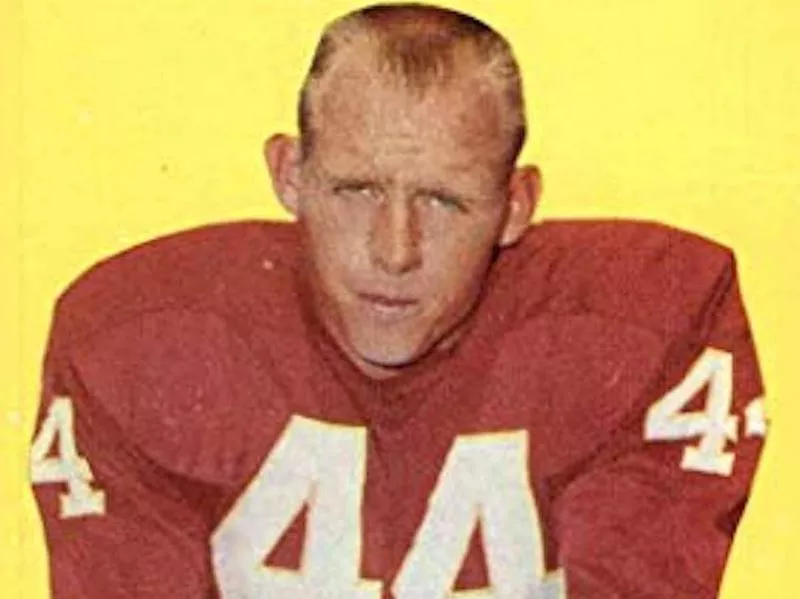
Jerrell Wilson in 1969. Amazon
Career: 7 seasons (1963-69)
Teams: Kansas City Chiefs
Statistics/14 games: 65.8 punts, 43.9 yards/attempts, 0.6 blocked
All-Star Games: none
League championships: 1969 (Super Bowl IV)
Bottom line: Jerrel Wilson had the highest punt average a record five times — two seasons in the AFL and three consecutive ones in the other league.
He was the all-time AFL leader in average for a season (45.4, 1965) and a career (43.9). “Thunderfoot” also was a factor in Super Bowl IV, in which he averaged 44.0 net yards on four kicks.
Not bad for an 11th-round draft pick, huh?
Honorable mention: Bob Scarpitto (Denver Broncos)
Speedy Duncan, Punt Returner
Career: 6 seasons (1964-69)
Teams: San Diego Chargers
Statistics/14 games: 26.2 returns, 12.3 yards/attempt, 0.8 touchdowns
All-Star Games: 1965-67
League championships: None
Bottom line: Even the San Diego Stadium vendors stopped in their tracks when wildly popular Speedy Duncan had the ball in his hands. Seven of his eight career touchdowns were from 60-plus yards out.
Speedy returned more punts (133) for more yards (1,641) and as many touchdowns (four) as any player in AFL history. We’re not the only one who considers the Jackson State flash to be the best punt returner ever.
“When it came to punt returning, I didn’t think anybody could hold my jock,” Speedy was quick to agree. “I just thought I was the best. You punt it to me, you’re gonna pay.”
Duncan also was a lethal kickoff return man. Yet there was more to his game than just kick returns. His quick feet translated well in bump-and-run coverage at cornerback, where he picked off 21 passes.
Honorable mention: Dick Christy (New York Titans), Claude Gibson (San Diego Chargers, Oakland Raiders)
Hank Stram, Head Coach
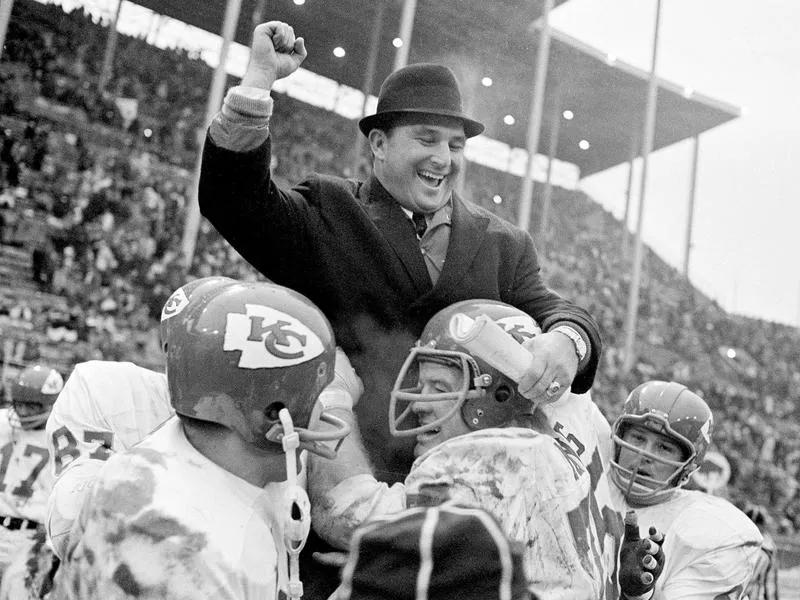
Kansas City Chiefs coach Hank Stram after the Chiefs beat the Buffalo Bills on Jan. 1, 1967, to win the AFL championship. Bill Achatz / AP Photo
Career: 10 seasons (1960-69)
Teams: Dallas Texans/Kansas City Chiefs
Regular-season record: 87-48-5 (.639)
League championships: 1962, 1966, 1969 (Super Bowl IV)
Bottom line: When team owner Lamar Hunt hired Hank Stram as the first coach in franchise history, the average fan didn’t know him from Henry Wilszek, even if they were one and the same. The decision turned out to be a stroke of genius.
The longtime college assistant was equal parts mentor and mad scientist. He knew how to win games and championships, more of both than any coach in league history.
While Weeb Ewbank and the New York Jets put their league on the map in Super Bowl III, many critics considered the outcome to be a fluke or even fixed to legitimize the AFL-NFL merger. It was Stram and the Chiefs who validated the AFL once and for all in a dominant Super Bowl triumph one year later.